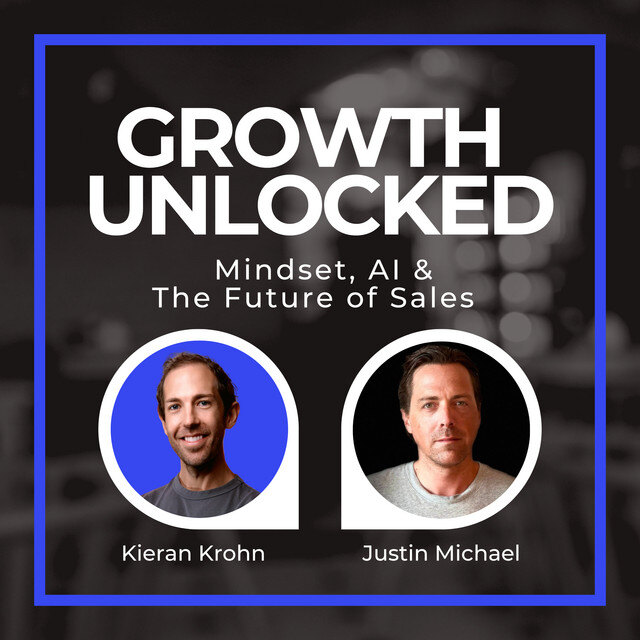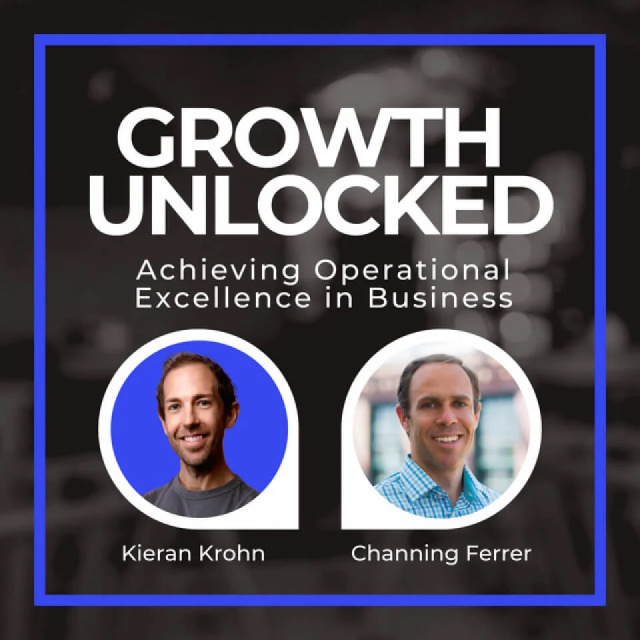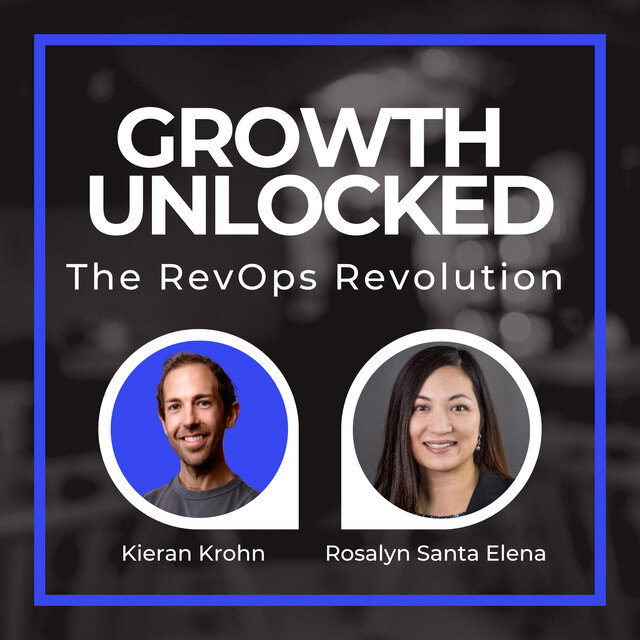'Mindset, AI and The Future of Sales' with Justin Michael

In the latest episode of the Growth Unlocked Podcast, renowned sales coach and author Justin Michael sheds light on the ever-evolving sales landscape, where mindset and artificial intelligence (AI) play pivotal roles. Drawing from his 23 years of experience in the field, Justin shares insights on how sales professionals can adapt, thrive, and maintain a human touch amid a rapidly advancing technological world.
In this blog, we will unpack Justin’s key insights, including the role of mindset in sales success, the strengths and weaknesses of AI in prospecting, his unique sales methodology (JMM), and the future trends that sales professionals need to prepare for.
The Power of Mindset: The Key to Sales Success
Justin kicks off the conversation by discussing the critical role mindset plays in the success of sales professionals. According to him, success in sales goes beyond technical skills and product knowledge—it’s about how confident a person feels when approaching top-level decision-makers.
He stresses that many salespeople fall short not because they lack sales knowledge but because they lack confidence. A salesperson’s self-image directly influences their interactions, especially when they face C-level executives or other high-powered decision-makers. “Sales isn’t just about what you do; it’s about who you are and how you see yourself,” Justin points out.
Drawing on behavioural psychology and neuroscience, Justin emphasises that a winning mindset involves a mix of self-confidence, resilience, and the ability to maintain a positive outlook even in the face of rejection. He highlights that building this mindset is essential for long-term success in the fast-paced world of sales.
AI in Sales: The Good, The Bad and The Future
While AI has become an integral part of many industries, Justin dives into the pros and cons of using AI in sales. On the one hand, AI helps sales teams automate repetitive tasks like prospecting, outreach, and pipeline management. This saves time and increases efficiency. AI-powered tools like email automation platforms and lead generation software are making it easier for sales teams to manage large volumes of prospects and customise outreach.
However, Justin identifies a significant challenge: AI-generated messages often lack the personal touch that human-to-human communication requires. AI, he says, can fall into the trap of being “too nice” and generic. This leads to messaging that lacks the spark needed to engage high-level executives or decision-makers. “Imagine receiving an AI-generated email that congratulates you on your new job, then immediately tries to sell you a CRM. It feels robotic and impersonal,” Justin explains.
The key, he believes, is to blend AI’s efficiency with human creativity. While AI can generate templates, it’s the salesperson’s job to add context, personality, and a human touch that cannot be automated. “AI can scale your outreach, but it can’t replace the deep personalisation and emotional intelligence that real conversations require,” Justin says.
The Justin Michael Method (JMM): A Revolutionary Approach to Sales
A significant portion of the podcast focused on Justin’s proprietary sales methodology, the Justin Michael Method (JMM). This approach, which combines neuroscience, game theory, and behavioural psychology, challenges traditional sales tactics by pushing professionals to rethink every aspect of their outreach.
The methodology emerged during the 2007 financial crisis when Justin faced a commission-only sales role that forced him to develop new strategies to stand out. One of his breakthrough techniques involved “waterfalling,” where he called senior leaders and routed his calls down to decision-makers rather than going directly to lower-level employees. He also experimented with the psychology of communication, such as using someone’s full name to engage them during cold calls, which often led to more meaningful conversations.
Today, JMM is built on seven pillars, each of which reimagines different parts of the sales funnel:
- Targeting and Trigger Events: Reimagining how sales professionals identify their targets and capitalise on key moments in a prospect’s journey.
- One-off Emails and Sequences: Hyper-short emails with 60% higher conversion rates, focusing on brevity and relevance.
- Cold Calling Openers: Breaking away from the traditional cold call approach to focus on power dynamics and effective openers.
- Visual and Video Prospecting: Using video content and visual cues to stand out in crowded inboxes.
- Linguistic Heuristics: Leveraging specific words and phrases that psychologically trigger positive responses, like expressing gratitude or asking for opinions in emails.
- Behavioural Psychology: Understanding how decision-makers think and using that to your advantage when communicating.
- AI Integration: Balancing automation with human personalisation.
These pillars, Justin emphasises, are essential for standing out in a crowded, tech-saturated sales environment. The uniqueness of JMM lies in its ability to constantly challenge the status quo by encouraging sales professionals to think differently.
Personalisation vs. Relevance: Striking the Right Balance
Justin delves into the ongoing debate between personalisation and relevance in sales outreach. He argues that while hyper-personalisation has its place—particularly when trying to reach high-profile decision-makers like the CEO of HubSpot—relevance at scale is often more effective in broader outreach efforts.
An example he shares is a successful outreach to the CMO of Marriott. Instead of relying on AI-generated messages, Justin used a quote from an interview she gave in Wired Magazine to create a highly personalised email. This effort resulted in a prompt reply and a multi-stage sales engagement.
By blending personal insights that AI would typically miss with relevant context, Justin demonstrates how sales professionals can cut through the noise and capture the attention of decision-makers.
Overcoming Self-Limiting Beliefs: The Key to Unlocking Potential
One of the standout moments in the podcast was Justin’s deep dive into overcoming self-limiting beliefs. Drawing inspiration from the work of thought leaders like Bob Proctor, Tony Robbins, and Maxwell Maltz, he explains that most of our actions are driven by our subconscious mind. These subconscious beliefs often limit our income, success, and overall potential.
To break free from these limitations, Justin suggests adopting practices like visualisation, affirmations, and questioning negative thoughts. He encourages sales professionals to challenge their inner dialogue and replace limiting beliefs with empowering ones. For example, instead of thinking, “I can’t close high-value deals,” Justin advises reframing the thought to, “I am capable of closing seven-figure deals.”
By doing this consistently, salespeople can reprogram their minds for success. “It’s not just about thinking positive—it’s about changing your identity and truly believing in your capabilities,” Justin says.
Empowering Sales Teams Through Vulnerability
When asked about the most effective way to lead sales teams, Justin advocates for creating a culture of vulnerability. He suggests that leaders should be transparent about their challenges and failures rather than trying to appear flawless. By doing so, they create a safe space where team members can openly discuss their struggles and seek help when needed.
This approach fosters mutual respect and trust, allowing teams to collaborate more effectively and address problems head-on. “The key is to build a culture where failing forward is celebrated and where open communication is the norm,” Justin explains.
The Future of Sales: What Leaders Need to Know
Looking to the future, Justin believes that the sales landscape will become increasingly dominated by technology. He predicts that AI will continue to evolve, with tools like reveal.co and Crossbeam offering powerful new ways to collaborate with partners and leverage data. However, he also warns that AI must be used responsibly, and human creativity will remain irreplaceable.
As sales leaders plan for the future, Justin advises them to invest in the right tech stacks and training for their teams. He emphasises the importance of focusing not just on adding headcount but also on equipping teams with the tools and knowledge they need to succeed in an AI-driven world.
Conclusion: Balancing Tech and Human Touch for Long-Term Success
Justin Michael’s insights offer a clear roadmap for the future of sales. While technology, especially AI, will continue to play a crucial role in scaling sales efforts, the human element—creativity, empathy, and personalisation—remains irreplaceable. By adopting a winning mindset, leveraging AI responsibly, and empowering teams through vulnerability, sales professionals and leaders can navigate the complexities of the modern sales landscape and achieve lasting success.
Curious to hear more insights from Justin Michael and Kieran Krohn? Check out the full podcast for an in-depth discussion on sales strategy, mindset, and AI.
Ready to revolutionise your sales strategy? Connect with Kieran Krohn for personalised coaching and insights. Unlock your sales team’s potential and prepare for the future of sales today.


